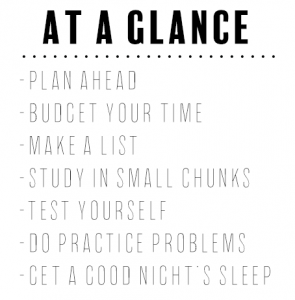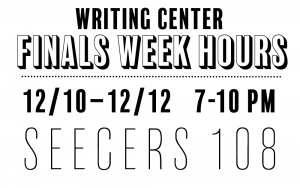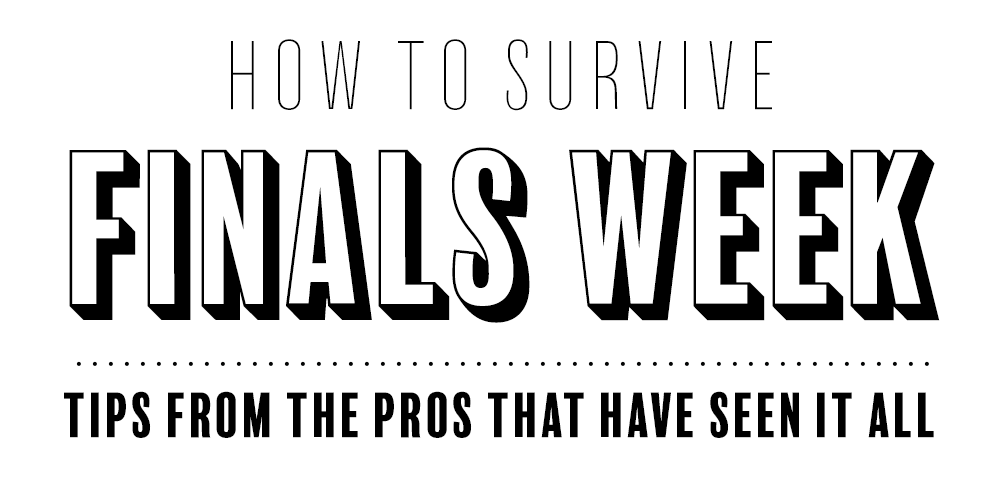With finals week looming ever closer the stress of exams and papers can become overwhelming. Thankfully, there are resources and study tips that can help make finals week just a little bit easier.
Throughout the semester the Academic Resource Center (ARC) has been hosting workshops for first year students to help with the transition to college. The final one of the semester covered finals preparation and gave tips for getting through this coming week relatively stress free.

Mary Beth Kallen, associate director of the ARC, gave an overview of what this workshop covered, as well as tips that apply to all students who find themselves overwhelmed by work. The three main things that she emphasized was time management, self-care and preparation.
“Overall what you want to be doing is managing your time,” Kallen said. She suggested that students should be planning their time about two weeks before finals week. “We don’t plan to fail, we fail to plan.”
Once students have a schedule Kallen suggests that they get organized. “Make sure you have or can get everything you need” she said, citing notes and sources for papers as examples. “That you’re not scrambling at the last minute [to find information] because that would add to your stress.”
“Use external organizers, even a simple to do list made in the morning of things you want to accomplish that day,” was another of Kallen’s suggestions to help lighten the mental load.
When it comes to actually studying for the final Kallen suggests actively doing something with the information.
“When you’re looking at something and reading it in the moment it does make sense. The best way to prepare to answer questions is by answering questions,” Kallen said.
Likening studying to a physical activity like football, Kallen explained that someone wouldn’t read a book on the sport and then go out and play a game, they would need to practice the physicality of throwing the ball and running plays. She suggests self testing as a way to practice the information that you’ve learned.
Andrew Rice ‘19, is a biology, chemistry and calculus tutor and he gave the same tip, saying “testing and quizzing yourself is the best way to prepare yourself for finals.”
“I feel like flashcards can be helpful but only in certain situations,” Rice said. He added that he thinks they’re better suited to things with a lot of memorization like languages rather than organic chemistry “since the course deals a lot more with concepts and mechanisms than rote memorization.”
For finals that involve math problems, Rice said that he thinks “doing practice problems for those courses are a much more efficient way of studying. Because if you don’t know what you’re doing that practice problem will show that.”
“Yes you can read your notes 50 times but that doesn’t mean you absorbed what you read,” said Nisha Godbole ‘20, a chemistry and psychology tutor.
She also suggests working with a partner or group on practice problems on a board in an empty classroom or the library. “Testing each other and finding a study buddy to test yourself with can help too,” said Godbole.
Rice said that it’s also important to be confident when it comes to exams. “I’ve seen both my tutees and students in workshops stress way too much over the information,” he said. Rice suggested that taking 20 to 30 minutes each day to study will help with that confidence when the day of the exam rolls around.
“All your notes are going to be in depth so for each lecture make one page of the most important key points or things you might forget and then read it over the day before the test,” Godbole said. Similar to Rice’s suggestion, this breaks up studying into smaller, more manageable chunks.
Kallen also suggested breaking up your studying, explaining that it was actually more effective. Advising against cramming, Kallen said that trying to study all your material in a few hours will actually hurt more than help. “Three one-hour sessions are better than one three-hour session,” according to Kallen.
Kallen, Rice and Godbole all gave similar tips as to how to prepare the night before an exam, especially the importance of getting a good night’s sleep. Rice added that it’s better to get a good night’s sleep and mess up on the exam because of not knowing the material than to know the material and mess up thanks to exhaustion.
“When you know you knew something but you still get it wrong on the exam is the worst feeling,” Rice said.
Godbole said to make sure an alarm is set; the worst thing would be sleeping through an exam. In the morning she says to eat a good breakfast, something that Kallen also mentioned. Kallen added that it’s important to eat protein, which increases alertness, and fruits, which improves recall.
“You want to make sure you have fuel, you want to relax as much as you can. That last minute trying to cram in things can actually make you more anxious because you might be afraid that you’re going to forget something,” Kallen said.
Additional information on study preparations for finals can be found in the ARC. Students can also schedule a meeting with Kallen to talk about strategies and concerns.

More than just exams, finals week is often the deadline for numerous essays. Kate O’Donoghue is the assistant director of the Writing Center and a ‘Berg alumnus who was willing to offer her suggestions for getting through those finals week papers.
“Think about the prompt, try and follow the prompt but don’t be afraid to follow your interest as well. Even if you write two pages that you’re interested in and then having to veer back and cut back will help you understand it better,” O’Donoghue said about how to start a paper.
To O’Donoghue, writing is a form of thinking and that it’s best to write a lot and then cut things out and edit down. “Write and write and write until you know what it is you mean to say,” O’Donoghue said.
“I never ever start with the introduction. I always free write my thoughts first” said Emily Panetta ‘20, one of the Writing Center’s tutors. She also said that she does this before even coming up with a thesis.
Sasha Cheer ‘19, another writing tutor, said, “when you start typing write about what you think about the prompt, don’t worry about quotes or secondary sources, just write about what you think.”
Another thing that all three recommended was reading the paper aloud, a standard practice in the Writing Center. Panetta says she does this to check the paper’s flow, grammar and that it doesn’t have errors. Cheer referenced how most people dislike reading their work aloud but she says it helps to catch grammar errors or sentence structure errors.
“Talking about your paper is the most helpful thing you can do,” O’Donoghue said. Whether it be with a writing tutor, professor or friend, O’Donoghue stressed that “talking about it will help you think about it.”
“I’m a big fan of peer editing or at least peer feedback,” Panetta said. Like O’Donoghue, she thinks that it allows for a reevaluation of what was written.
Cheer said that working with someone can help to make sure that the connections and logic of the paper are clear, especially on a research paper. This outsider’s perspective makes it easier to find holes in the author’s logic, or as O’Donoghue put it, “making the implicit explicit.”
O’Donoghue’s checklist before turning an essay in includes double checking the prompt to make sure it’s formatted correctly and that it answers the prompt, proofread, ensure it makes sense when it’s read and finally ensuring that it’s being turned in how the professor wanted, whether that was online or a hardcopy or both. The last thing on her list? “Making sure that i’m happy with the thinking that I’ve done.”
“Don’t be afraid to let yourself think and let yourself explore whatever topic you’re doing with the goal of exploring good thinking rather than to goal of creating some ‘perfect paper’,” Panetta said as a final piece of advice.
Melissa writes and reports for News and the OpEd column Graphic Opinions. A senior majoring in political science; when not in class you can find her working in the College's Special Collections and Archives or on her independent study on music education advocacy.






















